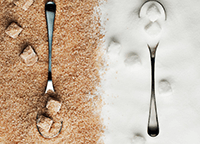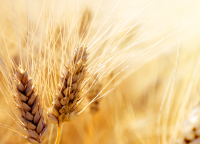Are you losing weight only to find that the pounds return, and you weigh more than you did before you started your last diet the last time?
Have you been trying all types of diet plans – low fat, high protein and nothing helps?
Lost track of how long you've been trying to release weight with no results?
I get your pain. In a world surrounded by ambiguous weight loss plans and products, losing weight can be hard. Yet, there is one golden rule you can follow for successful weight loss.
 That's right, just ONE habit to succeed in losing weight! Without further ado, I am talking about “Glycemic index” or some people call it the “Sugar Scale”.
That's right, just ONE habit to succeed in losing weight! Without further ado, I am talking about “Glycemic index” or some people call it the “Sugar Scale”.
Harvard Health Review published a research finding in 2004. It stated that it's not the high-fat foods that add pounds, but high sugary foods. The takeaway message was to watch the sugar content of the foods eaten.
Watch the Sugar Scale of your food! How do you do that? It's simple if you understand what a sugar scale actually is.
What is the “Sugar Scale” or “Glycemic Index”?
Glycemic index or GI indicates how fast or slow your food can raise your blood sugar levels after intake.
Glycemic index is the term used by health professionals. The GI of the foods you eat makes a big difference when it comes to stabilizing blood sugar levels in diabetics. It's also handy for anyone who wants to manage weight, suppress hunger and prevent disease.
How can the Glycemic Index help me with weight loss?
Studies show that when the blood sugar level is unstable 3 things happen in the body:
- Sugar cravings: Ups and downs in blood sugar make you crave high carb and sugary foods.
- Hunger & overeating: Unstable blood sugar leads to frequent hunger stimulation. This often causes you to overeat.
- Insulin spike: When there is a sugar spike in your blood it calls for more insulin action. Insulin is a fat storing hormone.
When there is an excess of insulin circulating in the blood it leads to weight gain.
TweetSo now that you know why you want to eat more foods with a low glycemic index you may be wondering how to get started.
Fruit is a healthy choice but some rate higher on the sugar scale than others so you want to stick with the ones that rate lower than an 11. Foods below 11 on the GI are considered low GI foods.
This may leave you to wonder if too much fruit can make you fat? I have you covered because I wrote an article explaining that for you too!
Here are some good tips to get started.
4 Ways to Use The Glycemic Index
 1. Look for fiber: Foods with high fiber have a low glycemic index. All non-starchy vegetables, and fruits like cherries, apples, strawberries, pears etc.
1. Look for fiber: Foods with high fiber have a low glycemic index. All non-starchy vegetables, and fruits like cherries, apples, strawberries, pears etc.
2. Combine smart: Combine complex carbohydrates with protein-rich foods. This helps to lower the rate of carb digestion. Adding protein helps to slow digestion, curb hunger pangs and keep you full for longer. It's no wonder protein plays a role in weight loss.
3. Choose healthy fats: Healthy fats from coconut, ghee, and avocado have little or no carbs. This brings down the GI value of the food.
4. Stay away from: Refined carbs, white flour and processed foods, because these have high GI values. Never choose them if you're serious about weight loss. Instead, eat whole, fresh, unprocessed foods. Some examples include millets, nuts, seeds, almond flour and coconut flour.
Here's a handy list of 16 superfoods that keep blood sugar low, burn fat and prevent disease.
The sweetest news of all is, you don't really have to spend your time researching which foods are best for weight loss. I've already done all the legwork for you.
I put together my very best fat burning recipes, meal plans and workouts.
It's all online at your fingertips and you'll even get the support of thousands of people around the world who are on this journey with you! All you have to do is Click Here to get started today.
Yours in health and happiness,
Danette
P.S. If you found this useful I invite you to share it with your friends, and I want to hear from you in the comments below. Do you pay attention to the Glycemic Index of the foods you eat now?






